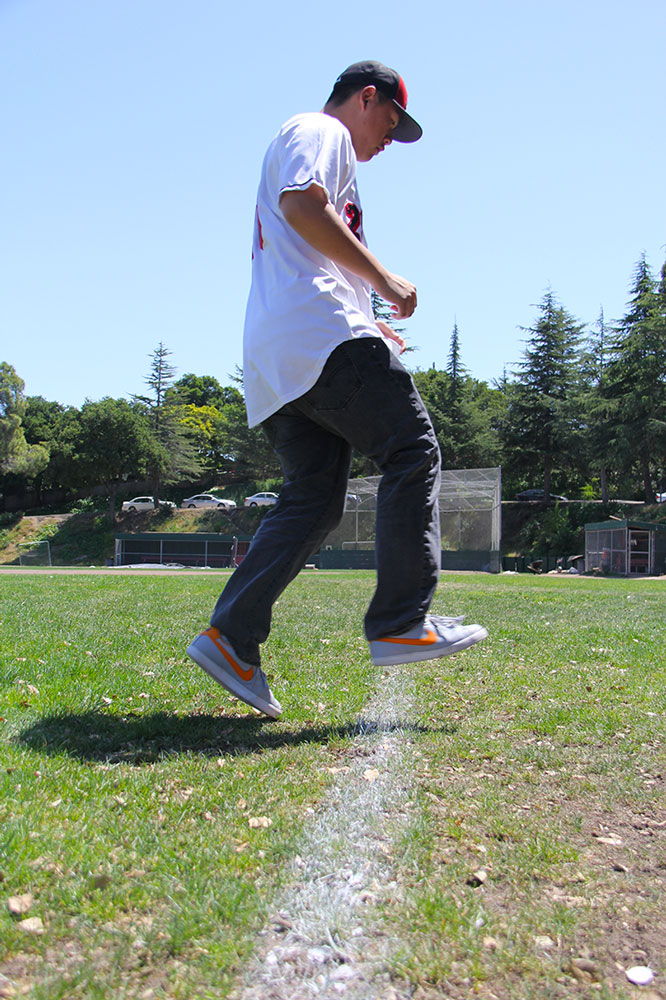
Like many baseball players, Junior Casey Cheng refuses to step on the foul line as he walks onto the field.
“I’m not superstitious, I’m just a little stitious,” claims junior Max Herrera. Despite his claim, Herrera, an avid Stanford football fan, listens to Taylor Swift’s “We Are Never Ever Getting Back Together” before every Stanford game, a ritual dating back to the first game of this year. Explains Herrera, “In week one, I listened to it on the radio, and they won. The games they lost this year, I didn’t listen before.” Herrera also loves the Indianapolis Colts, and has a separate way to help them win. He says, “I used to play the Colts’ matchup [on Madden] before every Colts game. It was scary how much they lined up, so when I won on Madden and they lost the Super Bowl, I was really shocked.”
Many students at Aragon have special lucky rituals like Herrera—and seeing as Herrera classifies his actions as “a little stitious,” one can only wonder what it truly means to be superstitious.
Junior Casey Cheng, a pitcher for the Aragon baseball team, has his own set of superstitions. Says Cheng, “Before I pitch, I say DCBA, which stands for Decide, Clear, Breathe, and Attack. It usually helps in pitching. Before I step on the field, I jump over the foul line. Even in warm-ups, I don’t touch it.” Cheng develops these rituals by experimenting with what helps his luck, so when he finds a lucky habit, he sticks with it.
Junior track runner Luis Hernandez used a similar process to reach his own good luck habits. Explains Hernandez, “I need to wear my lucky socks. I noticed there was a trend of being lucky [when I wore them]. I’ve tried not wearing them, and I was unlucky.” Hernandez admits that he has numerous other rituals and superstitions but doesn’t like to talk about them—it’s bad luck, he explains.
Junior Lila Dobroff, a player on the softball team, doesn’t have any superstitious habits of her own, but her team has a pre-game ritual they perform together. “Usually when we’re home before a game, we’ll kick dirt on the mound, write something on it, and spit on it,” explains Dobroff. “Then we’ll kiss our middle finger, touch the ball, and say something for the pitcher.”
The team started this habit after seeing other teams doing a similar ritual, and Dobroff claims it helps psychologically to calm pre-game nerves. Sophomore water polo goalie Stevin Diba also has a ritual he performs before every game. “Before every game, I tell myself no balls are going in the cage, and I tap the top bar three times,” says Diba. “I got lucky one time after I did it, so I kept doing it.”
Wrestling Coach Steve Ratto also has some superstitions he obeys in an attempt to increase his team’s luck. Says Ratto, “In my bag, I’ll keep a lucky poker chip to try to avoid injuries. If it’s lucky for me, I’ll keep it in my bag everywhere we go.” This ritual unfortunately wasn’t too successful in preventing injuries this season. But, as many athletes can attest, superstitions are different than other, more conventional methods to improve performance; the need to be lucky goes beyond logic or results.
Football Coach Steve Sell explains, “In some demented way, if I changed any routine and we lost a game, I would blame [the change] for losing. The desire to win is so great that any fair and legal thing you can do, whether it’s based in reality or not, I do.”
To help his team win, Sell keeps his routine exactly the same every Friday: “Tri-tip sandwiches when we’re home before the game. The exact shirt and pants I wear on gameday, the whole outfit. If there’s a jacket that’s unlucky, even if it’s cold, I won’t wear it. The workout I do: if I run on the streets that day and we won, I would repeat that workout next week. Captains—if I deem certain kids are lucky, I’ll keep them captains,” he explains.
But even for committed superstioners like Sell, there are some limits to the need for luck. Sell purportedly avoids the famous “underwear” superstition—wherein an athlete or coach would decide a pair of underpants were good luck and not wash them until they lost a game. “I do not sacrifice good hygiene for superstitions. I’m not afraid to wash anything,” says Sell.
Sell’s superstitions have at times put him in bizarre dilemmas—for instance, his newfound superstition revolving around the San Francisco Giants. In 2010 and 2012, the years the Giants won the World Series, the Sells did not go to any Giants games. Says Sell, “We’re having a serious family discussion about whether or not we should go [this year].”
From listening to Taylor Swift songs to not attending baseball teams, there is no doubt that Aragon students and coaches are superstitious. Whether the superstitions are done to avoid injury, take comfort psychologically, or just to improve one’s luck, there is always faith that these rituals will work, and that’s what gives superstitions power. No matter how illogical a habit is, if it helps lead to success, then there’s no reason not to do it. As a Bud Light commercial featuring red rabbit’s feet and mismatched socks declares, “It’s only weird if it doesn’t work.”



